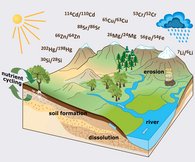Background
Over the last 5+ decades, stable isotope ratios of elements such as H, C, O, N, and S have become backbones of the (bio)geosciences, used to address a wide range of both fundamental and practical challenges in planetary geology, the origin and evolution of life, crust and mantle evolution, climate change, natural resources, and more. Only recently has attention been paid to stable isotope variations of the other elements. Advances in mass-spectrometric methods and techniques have opened opportunities to exploit metal isotope variations to fingerprint a variety of geological processes.
Stable metal(loid) isotopes occur naturally in varying abundances across diverse geological materials, including rocks, soils, sediments, water bodies, and organisms. Their distribution is influenced by factors like geological processes, chemical reactions, and biological activity. HELGES specializes in measuring stable metal(loid) isotopes such as Li, Mg, Si, Fe and Sr, among others. A special ability is the capacity to couple single- and multi-collector ICP-MS with our cutting-edge femtosecond laser system, enabling us to conduct in-situ analysis of solid samples that offers insights into both isotope compositions and element concentrations at micro spatial resolutions. Our research focuses on employing stable metal isotopes to explore the processes of silicate weathering and erosion on Earth Surface from local to global scales.
Scientific key questions
- What are the primary factors that control silicate weathering processes?
- How do the degrees and rates of silicate weathering vary over time and with changes in climate or geological environments?
- How do factors such as mineralogy, temperature, pH, and biological activity affect isotopic fractionation?
- What are the instrumental limitations on the accuracy and precision of both solution-based and in-situ analyses of stable metal(loid) isotopes?
For more details on our infrastructure, go to the HELGES page.


